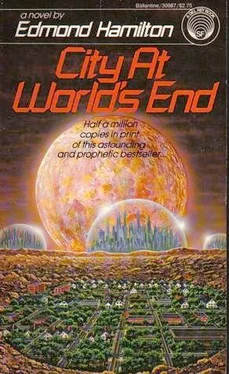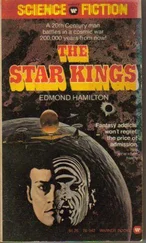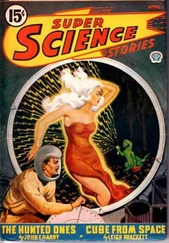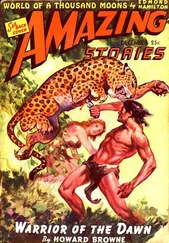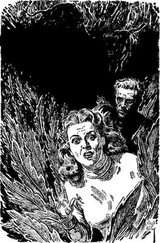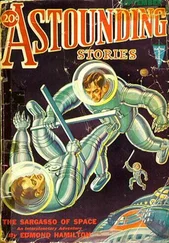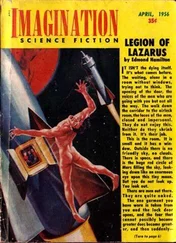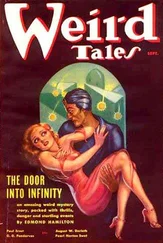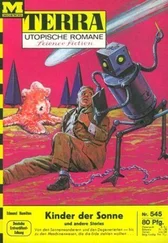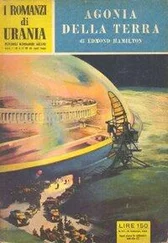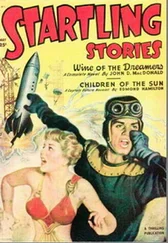Kenniston saw ahead of them the line of demarcation, the boundary between the past and what was now Earth. They reached it, passed it—
And then the rolling, ocher-yellow plains were all about them, barren and drab beneath the great, firelashed red eye of the Sun. The cold wind whooped around them, as they started to climb the easy slope toward the ridge. Behind his jeep, Diesels, jalopies, buses, shiny station wagons rolled with roaring, sputtering, purring motors.
Kenniston looked back down the slope at them. Already the other Ward was moving out, and he rode at the head of a huge caravan of vehicles crawling endlessly out of Middletown—a caravan out of the Earth that was gone forever, into this unguessable tomorrow.
When they came up over the ridge, and for the first time had view of the distant domed city that shimmered in the wan light far out on the desol-ate plain, Kenniston could sense the shock of doubt and fear that ran through all of this host who were seeing it for the first time. He could see it in all their peering faces, pale and strained in the red light of the dying Sun.
Even he, seeing it for only the second time, felt an inner recoiling. With his mind still filled with every sight and sound and smell of the old town they had left, the alien, solemn, deathly city of the dome seemed to him impossible as a refuge. He choked down that feeling, he had to choke it down; it was go on or die.
“Keep moving!” he shouted, sounding the jeep’s horn to command attention, gesturing authoritatively forward. “Keep going!”
He conquered that brief pause of recoil, got them moving over the ridge, skidding and sliding down the other slope, in clouds of heavy dust.
He glimpsed Mayor Garris staring ahead, his plump face shocked and pallid. He wondered what Carol was thinking, as she looked out at the lonely shining bubble in the sad wastes.
The endless caravan, shrouded in dust, was halfway down the long slope when Kenniston heard a raging of horns and looked back. An old sedan had stopped squarely in the middle of the narrow track the trucks had beaten down across a shallow gully. Cars were pulling out around it, wallowing in soft earth, jamming their low-hung frames against the banks, getting inextricably tangled. Behind them, the line was damming up.
Kenniston yelled to Lauber to keep the head of the caravan moving on toward the distant dome, and then sent his jeep snorting back along the line. A knot of people had collected now around the offending sedan.
Kenniston hastily shouldered his way through them.
“What the hell’s going on here?” he demanded. “Whose car is this?”
A weatherbeaten, middle-aged man turned to him, half-scared, half-apologetic. “Mine—my car. I’m John Borzak.” He gestured to the back seat of the old sedan. “My wife, she’s having a baby in there.” He added, as an afterthought, “My fifth.”
“Oh, Christ, that’s all we needed!” Kenniston cried. Borzak looked instantly guilty. He looked so sad that Kenniston began to laugh. Suddenly all of them were laughing, in sheer relief from nervous tension.
He set men scurrying to get a doctor and ambulance out of the procession, and meanwhile willing hands carefully rolled the old sedan a little aside.
The dammed-up lines of cars began to roll again. But the pause, the waiting, the minutes spent in staring at the drear landscape, had been too much for some of those in line. Kenniston saw cars, only a few of them as yet, curving out of line and scrambling on the slope to swing back toward Middletown.
He’d feared that, above all things. People—people of a 20th Century Middlewestern town—could take only so much of the unknown. But he had to stop them, or panic would spread like fire that nobody could stop.
He bucketed the jeep after them, got ahead of them by the advantage of his four-wheel drive, and then blocked their way back and stood up in the jeep and shouted at them and pointed ahead.
A man who looked like an aging carpenter, with a knobby face sheet-pale now, cursed Kenniston out of the depths of his fear.
“We’re not going out to die in this damned desert! We’re going back home!”
“You’ll never even get near it!” Kenniston warned. “There are special guards who won’t let anyone back into Middletown! Get it into your heads that the place is a death trap, will you!”
“Oh, Hugh, maybe we’d better go on!” whimpered the shapeless woman beside the man.
“Like hell we will! I’m a free American and this isn’t any dictatorship!”
Kenniston found the only argument that could sway these people who were recoiling from the deathliness of the desert.
“If you go back, if you do get into Middletown and stay there, you’ll soon be all alone there! You and the few like you—all alone, here at the end of the world, with the night and the cold!”
That got to them, replacing their fear with a greater dread, the dread of aloneness in this lonely world. The knobby-faced man looked sick and trapped, but he finally turned his car around, and the other cars followed him back into line.
Kenniston’s squad cars had come up but they weren’t needed. He told them, “Watch the line close! Don’t let one start to turn again—not one.”
He fought the jeep back up along the line, choking on dust and exhaust fumes, hanging precariously to the wheel, deafened by the continuous roar of motors.
At the head of the caravan he was at least out of the dust, and could look ahead at the distant city. It was still only a shimmering, tiny bubble on the horizon, only a glittering point lost and drowned in the vast indifference of the ocher-colored wastes that stretched—how far? Clear around the world, over the beds of dried-up oceans and the sites of vanished cities? Was the bottom of the Atlantic like this, was New York, was Paris, were the Poles?
He had to forget that and keep his mind on the city ahead, on the job of getting these thousands of people to it, for if he didn’t the weight of the whole dying world would come down upon him like an avalanche and he would cease to struggle. The world couldn’t all be like this, there must be green valleys and people somewhere yet. But there wasn’t time to think of it now, they had hit the road that led to the portal and the dome of man’s last refuge was towering, colossal, in front of them.
He saw that Hubble’s men had closed the portal. That would be the first step, of course, to conserve what warmth there was and keep out the frigid wind. It opened now to receive them, and an armed man waved and smiled, and then clung on to the side of the jeep.
“Straight up this boulevard, and then turn. I’ll show you. Yeah, we got the section ready. No, no sign of anything. I don’t think even a mouse lives here anymore.” A pause. “I’m sure glad you people have got here. This place is so damned quiet it would scare you.”
The tall, white silent towers watched them, the long, long line of dusty cars and trucks and buses that crept along the empty boulevards. The noise of motors greatly magnified echoed and rebounded from the walls and was repeated faintly from the dome, and the very shocking loudness of the sound made Kenniston shiver.
Apart from that mechanical racket, a curious hush had come over the Middletowners. All down the lines heads were thrust forth out of car windows, looking, peering, savoring the height of buildings whose tops they could not see, staring at the lines and colors that were alien to all they knew, listening to the emptiness. Kenniston knew how they felt. It was too big, and too strange. Even a native New Yorker would have found awe among these mighty towers, and to the folk of Middletown, used to the little slate-roofed houses and the squat buildings of dingy brick, they were overpowering, crushing, with something in them of dread because they were all deserted.
Читать дальше
